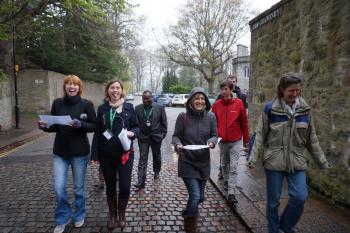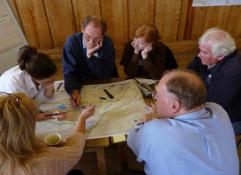Introduction to SEGS
Posted by Kerry Waylen on Monday 20 October 2014
It's my pleasure to introduce the 'SEGS blog'. SEGS is the acronym for the Social, Economic and Geographical Sciences group at the James Hutton Institute. We hope reading this 'SEGS' blog help give readers some sense of the vibrant ideas and diverse activities represented by members of this group.
We plan to update this blog at least once or twice a month, and new posts might encompass anything from a 'sneak preview' of early findings from a research project, through to comment about a topic in the news, or a discussion of a recent academic paper. 
For this first blog post, I think I should be sensible and start us off by saying something about SEGS itself! Our group contains a range of researchers, using a range of qualitative, quantitative and mixed methods and often taking interdisciplinary and/or participatory perspectives. In recent years we have been grown, and at present we are probably about 40 members of staff, ranging in age and career stage, plus we also have PhD students.  Between us we not only represent a range of disciplines, but we also work on quite a wide range of topics, ranging from natural resource governance to rural economic modelling, ecosystem services valuation, sustainable behaviours (including transport and energy), rural community vibrancy, well-being and rural socio-economic transitions. It is pretty hard to find a concise label that adequately captures our full range of expertises and interests (we have tried!). Having said that, we may be diverse but we often work together, and collaboration is a hallmark of our work. The activities of the group frequently unite around a particular project and many members work on more than one topic. We also frequently collaborate with colleagues in the other science groups within the institute, and with researchers in universities and research institutes across the world. Although we are based in Scotland, our case studies range from places in Scotland through to other places in Europe, and work in developing countries such as Africa Asia and Latin America.
Between us we not only represent a range of disciplines, but we also work on quite a wide range of topics, ranging from natural resource governance to rural economic modelling, ecosystem services valuation, sustainable behaviours (including transport and energy), rural community vibrancy, well-being and rural socio-economic transitions. It is pretty hard to find a concise label that adequately captures our full range of expertises and interests (we have tried!). Having said that, we may be diverse but we often work together, and collaboration is a hallmark of our work. The activities of the group frequently unite around a particular project and many members work on more than one topic. We also frequently collaborate with colleagues in the other science groups within the institute, and with researchers in universities and research institutes across the world. Although we are based in Scotland, our case studies range from places in Scotland through to other places in Europe, and work in developing countries such as Africa Asia and Latin America.
I hope that gives you some sense of our vibrancy and diversity! Please visit our main webpage if you'd like to find out more about the group and individual staff members. Alternatively, sit back and wait for more blog posts!
Author: Kerry Waylen






Comments
Post new comment